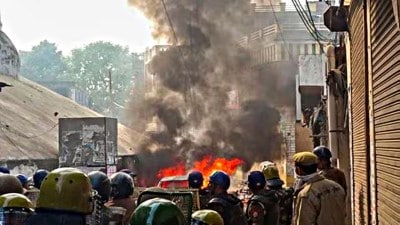1984,still
Three decades on,the search for accountability for Delhi 1984 remains a tortuous process
Three decades on,the search for accountability for Delhi 1984 remains a tortuous process
On Wednesday,a Delhi court set aside the CBI closure report that exonerated Jagdish Tytler of involvement in the 1984 anti-Sikh violence in Delhi,asking the agency to examine eyewitnesses and fully investigate their claims. This is yet another reminder that the search for justice and accountability for the killing of nearly 3,000 Sikhs in Delhi and other cities has remained protracted and agonising. Twenty-nine years after the event,10 commissions of inquiry have been instituted,but the cases against influential accused have meandered. By all accounts,in the immediate aftermath of Indira Gandhis assassination,the Congress government stood by as many of its political workers led the charge,and sections of the police and administration were flagrantly co-opted. Investigations broke down in cases either FIRs were not framed,or eyewitness claims were questioned. Politicians accused of direct involvement by survivors suffered no setback to their careers. The Congress leadership,while making statements of apology,treats the matter as one best consigned to history,rather than one still desperately in need of resolution. Three decades on,the evidence may be mouldering,but those whose lives were changed by the riots know that justice has been comprehensively denied.
Of course,Tytlers guilt or blamelessness will only be proved in court,but the trajectory of his case may be indicative of the tortuous process of extracting accountability. After a changed affidavit,the Nanavati commission,in 2005,declared Tytler very probably complicit in organising the violence,after which he was forced to resign from the cabinet. The CBI has twice declared him innocent,after failing to locate an eyewitness whom the media managed to track quite easily. This is the second time the courts have ordered the investigative agency to act with more commitment.
The protracted inability to bring all the perpetrators of the 1984 riots to account is part of a larger taint. What links the violence in Delhi with the events of Bombay 1993 or Gujarat 2002 is that political leaders and police officers who participated in communal violence mostly got away. These holes in the justice process have undermined public trust in the impartial authority of the state,and its commitment to protecting minorities. References to the 2002 riots are routinely brushed off,or countered,with talk of the Congresss role in 1984. While cases of the Gujarat bloodshed may be slowly progressing towards some measure of closure and accountability as the convictions in Naroda Patiya suggest,for instance one can only hope that the courts decision to reopen the Tytler file is indication that a fuller justice may still be possible for Delhi,1984.
- 01
- 02
- 03
- 04
- 05































